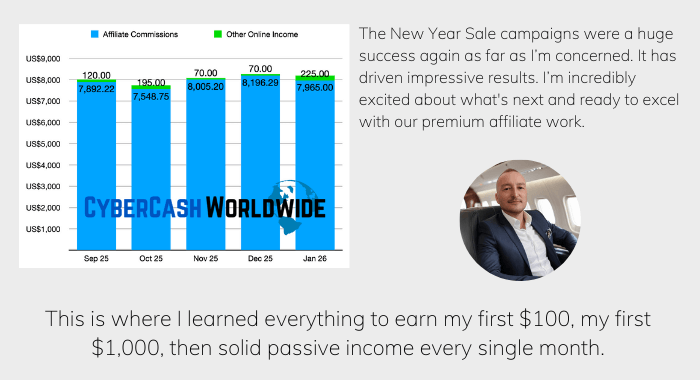They say that the key to building confidence is simply taking that first step. Even if you're not entirely sure of yourself, just put on a brave face and forge ahead, and it will do wonders over time. Do you agree?
So does it work online too? If you keep pretending to be confident and projecting a strong online presence, can you actually build your self-assurance and achieve success? Let's find that out.

Pretend To Be Confident. You Will Start Believing Yourself
Our brains are pretty amazing. Did you know that each time we learn something new or reinforce a belief, our brain physically changes?
So pretending to be confident can actually help in rewiring your brain. You're essentially training your brain to adopt a new pattern of thinking, like when you're practicing a new skill. Your brain loves patterns/routines.
This means that when you consistently act confidently, you're essentially telling your brain, "Hey, this is how we do things now." And your brain listens. It starts to rewire itself, making confidence more of a default state than an act. Sounds pretty neat, right?
Did You Know?
- Imposter Syndrome: An estimated 70% of people will experience at least one episode of imposter syndrome in their lives.
- Entrepreneurial Optimism: About 81% of entrepreneurs are confident about their business's future, despite high failure rates.
- Job Qualifications: Studies show that men apply for a job when they meet only 60% of the qualifications, but women apply only if they meet 100% of them.
- Leadership Confidence: Roughly 70% of leaders in businesses sometimes feel they are not qualified for their managerial roles.
- Social Media and Self-Presentation: About 60% of people admit to presenting a more desirable version of themselves on social media.
We're All Trying to Impress
Ever feel like you're walking on a tightrope online, worried about every like, comment, or share? You're not alone in this. Most people online are also trying to make a good impression.
They're more focused on how they're perceived rather than judging others. It's like a masquerade ball where everyone is more concerned about their own masks. We're all in the same boat, trying to get social media likes, right?
The Reality of Judgment
Sure, judgment happens. It's part of human nature. But here's the thing: online judgment is often fleeting. Someone might scroll past your post and forget about it minutes later. Even if you do face criticism, it's usually not as personal as it feels. People are biased, right? They react based on their own experiences. It's more about them than you.
The Freedom of Anonymity Online
The internet, with its cloak of anonymity, is like a never-ending masquerade ball. You get to wear a mask, and suddenly, you're not just you anymore. You can be anyone or anything. This anonymity gives you a playground for self-expression without the usual hang-ups.
- Trying New Things: With a mask on, you might find the courage to say things you wouldn't usually say or explore topics you're typically shy about.
- No Prejudgments: People react to your ideas, not to who they think you are in the real world. Refreshing, right?
Did You Know?
- Startup Success Rates: Approximately 90% of startups fail, but persistence and adaptability are key traits in those that succeed.
- Self-Employment Challenges: Over 50% of self-employed people have admitted to facing challenges they were not fully prepared for.
- Career Advancement: Around 40% of people say they've pretended to be more confident in a professional setting to advance their career.
- Psychological Pricing: More than 80% of marketers use psychological pricing strategies, arguably a form of "faking" the true value to create a perception of a deal.
- Networking Overestimation: Many professionals overstate their networking abilities, a key aspect of career advancement.
Pseudonyms: New Names, New Possibilities
Using a pseudonym online is like getting a fresh start. You get to create a whole new persona, or maybe several, each with its own story.
- Crafting Personas: Each pseudonym can represent a different aspect of your personality. Maybe one is the jokester, while another is the philosopher.
- Evolving Over Time: As you grow and change, so can your pseudonyms. Isn't it great to have that kind of flexibility?
Experimenting Without Fear
When you're behind the veil of anonymity, you're free to experiment. You can test out ideas, play with different styles of communication, and engage with topics you might normally avoid.
- Safe Space for Expression: You can voice opinions or explore sensitive subjects without fear of personal backlash. It's like having a safety net, right?
- Creative Freedom: Anonymity can be a breeding ground for creativity. You can write, create, and share without self-censorship.
Learning Things Anonymously
Anonymity isn't just about hiding; it's also about learning. With the freedom, you can gather knowledge and insights from a range of perspectives.
- Diverse Perspectives: Engaging anonymously allows you to see and understand viewpoints from all walks of life.
- Personal Development: The feedback and interactions you receive help in developing your thoughts and ideas. It's a bit like undercover research, isn't it?
The Psychological Benefits
Being anonymous can be surprisingly beneficial for your mental well-being. It can be a therapeutic tool, helping you to work through thoughts and feelings in a pressure-free environment.
- Stress-Free Interaction: Without the stress of maintaining a certain image, you can truly relax and be in the moment.
- Enhanced Well-being: Expressing yourself freely and creatively can have a positive impact on your mental health.
Even behind a mask, you can form genuine connections. These connections are based on shared interests and ideas, rather than external factors. Conversations can sometimes be more genuine when they're not influenced by biases about identity.
Positive Self-Talk

It all begins with the conversations you have in your head. Ever caught yourself thinking, "I can't do this"? That's where you flip the script. Instead, try saying, "I'm going to give it my best shot."
Replace doubts with a can-do attitude. You're basically telling yourself, "Hey, I might not have all the answers, but I'm going to try anyway." Feels empowering, doesn't it?
You really need to give yourself permission to act like the person you want to become. Say you're in a meeting and feeling out of your depth. Here's where you channel your inner confident self. Stand a bit taller, share your ideas as if you believe in them fully. It's surprising how quickly your outside can influence your inside, right?
Did You Know?
- Professional Training Gaps: About 30% of employees receive no formal job training, leading them to adapt and often 'fake' competence initially.
- Performance Anxiety: Nearly 75% of people have some level of anxiety about public speaking, often overcoming it by projecting confidence.
- Social Confidence: Over 50% of adults consider themselves shy, which may lead them to 'act' more outgoing in social or professional settings.
- Adapting to Change: Around 65% of people report that they feel unequipped to handle change, often having to pretend they can manage better than they feel.
- Cultural Fit in the Workplace: Nearly 80% of employers prioritize cultural fit, leading some candidates to exaggerate their compatibility during interviews.
Highlight Your Success
Sharing your successes, no matter how big or small, is a great way to boost your morale and inspire others. It's like giving yourself a pat on the back. Got a new job, learned a new skill, or just managed to get out of bed on a tough day?
It's not just about bragging; it's about recognizing your own efforts. When you celebrate your achievements, others see your progress and may feel motivated too. Plus, it feels good to look back at your posts and see how far you've come, right?
Project Confidence
Talking about your skills and experiences as if you're an expert isn't about misleading others; it's about believing in yourself. You know more than you give yourself credit for. Whether it's about a hobby, a professional skill, or just life wisdom, share your insights. It's about owning your knowledge.
This confidence can attract positive attention and open up new conversations and opportunities. It makes you approachable, and who knows, you might even end up helping someone out. That's a good feeling, isn't it?
Post good pictures, write interesting stuff, and share things that show you know what you're talking about. You don't have to be an expert. Just learn a bit, share a bit, and keep getting better.
Share What You Know
You don't need to be a genius to have something useful to say. Do you know how to bake a mean loaf of bread? Share your recipe! Love video games? Share tips or review a new game. The more you share, the more people will start seeing you as someone who knows their stuff.
Join the Right Groups
Go where the action is! On the internet, you'll find tons of places where people are talking about the things you love. So go ahead and join those Facebook groups, hop into Twitter chats, and read what others are saying on Reddit. This can help you make friends and learn new things.
Be Nice and Help Others

You know that feeling when someone helps you and you just want to high-five them? Be that person for others. Answer questions if you can. Share other people's posts that you like. You'll be surprised at how fast you make friends this way.
Listen and Learn
Now here's the cool part. As you act like you're already a pro, you start to learn what it actually takes to be one. You'll make some mistakes, sure. But you'll also learn a lot! So listen to what people are saying, get feedback, and keep getting better.
Why This All Works
You may wonder, is acting the part really going to help me? Yes, and here's why. When you act confident and skilled, people start to think of you that way. And guess what? You start to think of yourself that way, too. It's like a circle of awesomeness. You act like a pro, people see you as a pro, and then you become a pro. Pretty cool, huh?
Did You Know?
- Online Learning and Skill Development: With the rise of online learning platforms, many professionals portray skills they are still developing.
- Feedback Seeking: Less than 30% of workers actively seek feedback, yet many will project confidence in their roles.
- Creative Problem Solving: About 60% of employers value creative problem solving, a skill often developed by tackling unfamiliar challenges.
- Remote Work Adaptation: With the rise of remote work, many employees and managers are 'faking' their comfort and efficiency in this new mode of work.
- Negotiation Skills: Approximately 40% of people feel uncomfortable with negotiation, often having to portray more confidence than they feel in these situations.
"Fake It 'Til You Make It" Online
"Fake it 'til you make it" doesn't mean being dishonest. You really are projecting confidence, even when you're still figuring things out.
1. Make a Solid First Impression
Your website and social media are like your business's outfit - they need to look sharp. Invest in a professional design. It doesn't have to cost a fortune. There are plenty of affordable freelancers who can make your online presence pop.
Did you know that 75% of consumers admit to making judgments on a company's credibility based on the company’s website design? That’s huge!
Talk the Talk
When you're new, you might not have a lot of experience or success stories to share. But you know what you can share? Your passion and expertise. Write blog posts, create content, and engage on social media about your niche. You'd be surprised how much you know when you start writing it down.
I remember when I started, I felt like I didn't know enough. But once I began sharing my thoughts online, people started seeing me as an expert.
2. Networking
Connect with Peers
Networking isn't just for the big players. Join online forums, attend virtual conferences, and connect with others in your field.
When I was starting, I (reluctantly) reached out to a few more established business owners for advice. Many were happy to help. Plus, these connections can lead to collaborations. Follow industry leaders on social media, subscribe to newsletters, and read blogs. You can learn a lot just by observing how successful businesses operate.
3. Be the Business You'd Want to Buy From
Maintain Top-Notch Customer Service
You might not have many customers at the start, but treat every single one like gold. Fast, friendly customer service can set you apart from bigger competitors. In fact, 89% of consumers are more likely to make another purchase after a positive customer service experience.
Ask for Feedback
Don't be shy about asking customers for their thoughts on your product or service. This shows you care and are willing to improve. Plus, you can use this feedback to make your business even better.

4. Marketing: Smart, Not Expensive
- Social Media: You don't need a big budget for effective marketing. Social media - Create shareable content that speaks to your followers. Remember, it's not about how many followers you have, but how engaged they are.
- Email Marketing: Start building an email list from day one. It's a direct line to your customers and potential customers. Share updates, promotions, and insights. It's a powerful tool, especially when used right.
5. Keep Adapting
Stay Updated
Things change fast in the online world. Keep up with the latest trends and technologies. This keeps your business relevant and shows your customers that you're a forward-thinking company.
Don't Be Afraid to Pivot
Your first idea might not be the one that takes off, and that's okay. Be open to changing your approach. Flexibility can be a real asset in the online business world.
6. Fake Confidence
Projecting confidence online is super important, even if you don’t feel confident yet. Respond to comments and messages promptly and in a friendly manner. Share your thoughts and opinions openly, and don’t be afraid to put yourself out there. For example, if someone asks for your opinion on a cooking technique, share your thoughts confidently, even if you’re not 100% sure.
Shut Up and Listen
With all the said...
When you keep talking about yourself non-stop, what happens? Some may find your enthusiasm infectious, but it's off-putting to the majority. You know what? Too many people talk about themselves for nothing, and nobody else cares about anybody else.
When you have something you really think important to say but nobody's mention, that's when you open your mouth. Otherwise, shut up and keep listening. The ball is in your court.




